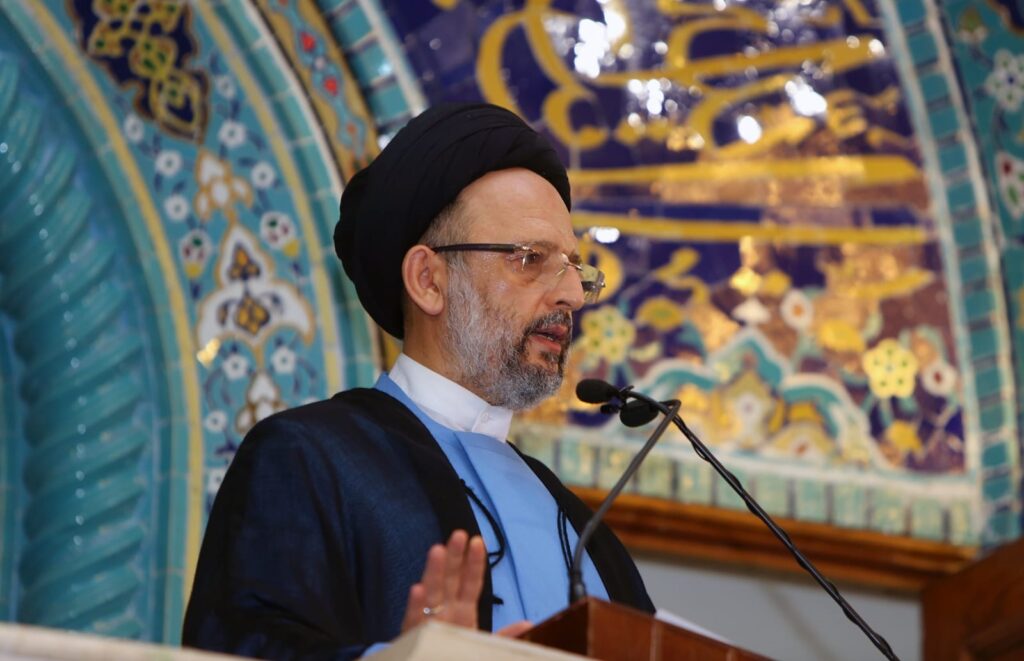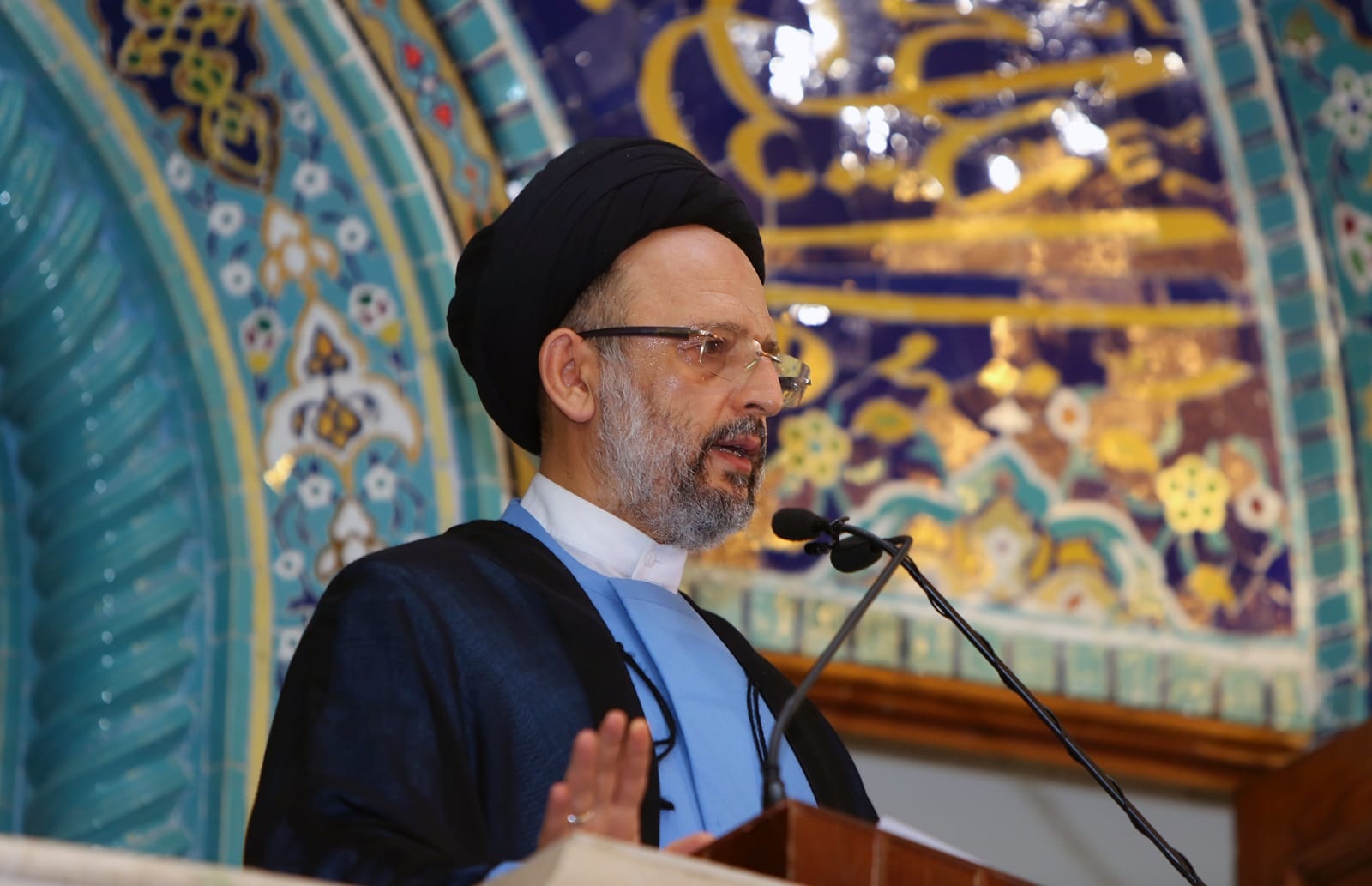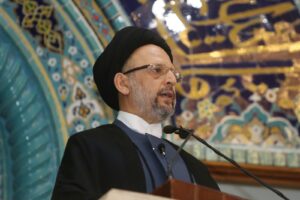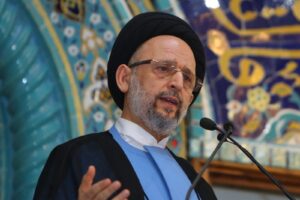In The Name of Allah, The Compassionate, The Merciful. Fear of Allah
His Eminence, Sayyed Ali Fadlallah, delivered the two Friday prayer sermons at the Imamain Al-Hassanain Mosque, Zul Qida 24,1445/May 31, 2024. Several prominent religious scholars, dignitaries, and hundreds of believers attended the Jumu’a prayer. Following is a summary of the sermons.
The First Sermon
Allah, the Most Exalted, says in His Glorious Book: The Day every soul will find what it has done of good present [before it] and what it has done of evil, it will wish that between itself and that [evil] was a great distance. And Allah warns you of Himself, and Allah is kind to [His] servants}. Allah, the Most Exalted, speaks the Truth.
Allah, in His guidance to humankind, emphasizes instilling a sense of fear of Him. This fear is meant to create a balance within one’s personality and develop a deterrent so that one does not dare to commit what He has forbidden or neglect the responsibilities entrusted to them. Fear of Allah does not mean terror, but rather an awareness of His greatness within oneself and the fear of losing His mercy and being subject to His punishment in this world or when standing before Him in the Hereafter.
Allah indicates this when He says: {And Allah warns you of Himself} and {So fear only Me}. He also says: {O mankind, fear your Lord. Indeed, the convulsion of the [final] Hour is a terrible thing. On the Day you see it every nursing mother will be distracted from that [child] she was nursing, and every pregnant woman will abort her pregnancy, and you will see the people [appearing] intoxicated while they are not intoxicated; but the punishment of Allah is severe}, and {We will attend to you, O prominent beings}.
Allah considers this feeling a manifestation of faith, as one cannot be a believer unless they fear their Lord. He says: {And fear Me, if you are [indeed] believers}.
The Qur’an also indicates that this fear is the conduct of the prophets, as He says: {Those who convey the messages of Allah and fear Him and do not fear anyone but Allah. And sufficient is Allah as Accountant}. The Prophet (p.) expressed this, as Allah tells us: {Say, “Indeed I fear, if I should disobey my Lord, the punishment of a tremendous Day”}.
This is also mentioned in the advice of Imam Ali to his son Hassan where he says: “I advise you, my son, to fear Allah in your private affairs and in public.”
The type of this fear is explained in the Hadith: “Fear Allah as if you see Him, and if you do not see Him, He surely sees you. If you believe that He does not see you, then you have disbelieved, and if you know that He sees you and you still commit a sin, then you have made Him the least significant observer upon you.”
This fear should lead us to avoid His wrath and loss of His love. In the Hadith: “Beware of Allah as He has warned you of Himself, and fear Him with a fear that shows its effect upon you.”
The effects of fearing Allah are highlighted in the Quranic verses and noble Hadiths. For instance:
– {But as for he who feared the standing before his Lord and restrained the soul from [his] desire, * Then indeed, Paradise will be [his] refuge}.
– {Indeed, those who fear their Lord unseen will have forgiveness and great reward}.
– In the Hadith: “Whoever avoids a sin or desire out of fear of Allah, Allah will forbid Hellfire upon him, protect him from the greatest terror, and fulfill His promise in His Book: {But for he who has feared the position of his Lord are two gardens}.”
– In the Hadith: “The head of wisdom is the fear of Allah.”
– In the Hadith: “Poor is the son of Adam; if he fears the fire as he fears poverty, he would be saved from both, and if he desires paradise as he desires wealth, he would achieve both, and if he fears Allah in private as he fears people in public, he would be happy in both worlds.”
– In the Hadith: “The highest ranking people with Allah are those who fear Him the most.”
The emphasis on instilling the fear of Allah in individuals and inviting them to it is due to the significant impact this fear has on their lives and their path in life. Allah highlighted this effect when He spoke about Abel (Habil), who refrained from killing his brother Cain (Qabil) when he said: {I will surely kill you}. Abel’s response was: {If you should raise your hand against me to kill me – I shall not raise my hand against you to kill you. Indeed, I fear Allah, Lord of the worlds}.
This same fear motivated the Ahl al-Bayt to endure severe hunger and deprive themselves of food to give it to the poor, orphans, and captives. Allah says: {And they give food in spite of love for it to the needy, the orphan, and the captive, [Saying], “We feed you only for the countenance of Allah. We wish not from you reward or gratitude. Indeed, we fear from our Lord a Day austere and distressful}.
Thus, fear of Allah, dear ones, acts as a safety valve against deviation, protecting a person, if they live by it, from lying, backbiting, gossiping, betraying trust, cheating, accepting bribes, corruption, or oppression, even if it involves taking a grain from an ant, as Imam Ali said: “If I were given the seven domains with all that exists under their skies to disobey Allah in taking a grain from an ant, I would not do it”.
In the Hadith: “Whoever knows that Allah sees and hears what he says, and knows what he does of good or bad, and this knowledge prevents him from doing ugly deeds, then he is the one who fears the standing before his Lord and restrains his soul from desires.”
In another hadith: “O son of Adam, you will continue to be in good condition as long as fear is your garment”.
However, talking about the fear of Allah does not mean ignoring the vastness of Allah’s mercy and His compassion towards His servants, as He described Himself when He associated it with His name, saying: “In the name of Allah, the Most Gracious, the Most Merciful“, and reminding us of it in every prayer and when reciting the Quranic chapters. Allah says: {And My mercy encompasses all things}
In the Hadith: “Indeed, Allah has mercy on the Day of Judgment that even Iblis (Satan) will stretch his neck in hopes of it”.
Hence, it is necessary to balance between fear and hope in Allah’s mercy, as He says: {Is one who is devoutly obedient during periods of the night, prostrating and standing [in prayer], fearing the Hereafter and hoping for the mercy of his Lord…},
It was narrated from Imam al-Sadiq), when asked about the advice of Luqman, that he said: “In it were wonders, and the most wondrous thing was when he said to his son: Fear Allah with a fear that if you brought Him the righteousness of the inhabitants of the heavens and the earth, He would still punish you, and hope in Allah with a hope that if you brought Him the sins of the inhabitants of the heavens and the earth, He would still have mercy on you. Therefore, dear loved ones, we must reinforce in our hearts the sense of Allah’s love for us, His mercy upon us, and His great eagerness to admit us into His Paradise and protect us from His punishment. And so that we do not despair, we need, in turn, to strengthen our fear of Him. This can only be achieved through the knowledge of Allah, so that we do not become arrogant, tyrannical, or stray from what is good for us in this world and the hereafter.
The more a person knows about the greatness of Allah, His might, and the punishment He has promised, the more they fear Him. Allah indicates this when He says: {It is only those who have knowledge among His servants that fear Allah}. It is also narrated: “The more a person knows Allah, the more they fear Him”.
Let our final supplication be: “O Allah, we ask You for the fear of the worshipers who worship You, the worship of those who humble themselves before You, and the certainty of those who trust in You”.
“O Allah, make my longing in my request like the longing of Your close ones in their requests, and my fear like their fear, and use me in Your satisfaction in a way that I do not leave anything of Your religion out of fear of any of Your creation.”
The second sermon
Worshippers of Allah, I advise you and myself with what the Commander of the Faithful, Imam Ali advised when he said: “Fear Allah concerning His servants and His lands, for you are responsible even for the lands and the animals.”
This is a call for us to fear Allah and to be accountable to Him by fulfilling our responsibilities in life, as the Imam broadened them. Our duties go beyond abstaining from forbidden acts and performing obligatory acts. They extend to our responsibilities towards His servants; we must not only avoid harming them and their interests but also strive to be a source of good for them and leave a positive impact on their lives. As the Imam encouraged: “Associate with people in such a way that if you die, they weep over you, and if you live, they long for you,” and “Be among people like the bee among birds.”
Another responsibility we bear is towards our nation, which should be dignified, free, and honorable, untouchable by the hands of the corrupt and the spoilers from within, and by the enemies from outside.
We are also entrusted with the earth that Allah has appointed us as vicegerents upon, to develop it in all ways of construction, to wisely invest its resources, and to avoid any form of corruption in it. Even towards animals, we have a duty to care for them and make proper use of them without causing them harm.
By realizing these responsibilities, we fulfill our duties towards Allah … By doing so, life will be better, and we will be more capable of facing its challenges and difficulties.
Starting with Gaza, where the Zionist enemy continues to commit massacres, the latest are the atrocities in Rafah targeting the tents of the displaced. This scene, which brings shame to humanity, continues despite the recent ruling by the International Court of Justice calling for a halt to the attack on Rafah, the request by the Prosecutor of the International Criminal Court for arrest warrants for the enemy’s Prime Minister and War Minister, and calls from the United Nations and the Security Council for a ceasefire. Despite the ongoing protests and marches around the world calling for an end to the genocide against the Palestinian people and the necessity of stopping the bloodshed and destruction, this entity shows no regard for international decisions, public opinion, or human rights, prompting us to consider carefully how to deal with this enemy.
This entity benefits from comprehensive support and coverage from its backers, placing it beyond any accountability or responsibility. Any condemnations we hear remain limited to statements and declarations of denunciation, which do not exert any real pressure on this entity to deter it from its crimes.
Meanwhile, the Palestinian people continue with the choice they have made in facing this enemy, expressed through their heroic and legendary steadfastness, their boundless patience in the face of the harm they endure, and their resistance which provides daily examples of heroism. This is evident through their unique jihadist operations, which make the enemy, despite its advancements, unable to maintain stability and freedom of movement in the territories it reaches. This resistance disrupts the enemy’s plans, preventing it from achieving the objectives set for its war, and plunges the entity into internal crises, both politically and security-wise.
While we salute the steadfastness of this people and their resistance, we renew our call to the Arab and Islamic world, along with all the free people of the world, to extend a helping hand to this people, supporting and aiding them to continue their resilience and steadfastness…
.
We pause to reflect on the events in Rafah on the Egyptian-Palestinian border, where clashes resulted in the martyrdom of an Egyptian soldier and injuries to others. This incident reflects the sentiments of the Egyptian people and their army in rejecting the practices of the Zionist entity. We express our condolences to the Egyptian people and their army in their tragic loss and pray for the recovery of the wounded.
Turning to Syria, the Zionist enemy continues its assaults, the latest of which occurred today in Homs Province, resulting in civilian casualties. In this context, we commend the restoration of diplomatic relations between Saudi Arabia and Syria, hoping that this relationship deepens and evolves, aiding in the resolution of Syria’s internal and external issues.
In Lebanon, the Resistance continues to play its role in supporting the Palestinian people within the limits it has set, and in defending against the Zionist enemy’s attacks on peaceful villages, including targeting civilians outside hospitals, as seen at Salah Ghandour Hospital. We salute the resistance for its role in supporting the Palestinian cause and defending its people, preventing the enemy from escalating its aggression. We call on the Lebanese people to unite in facing the repeated threats from the enemy.
We also regret the voices opposing the Lebanese government’s decision to provide urgent assistance to those displaced from border villages and those whose homes have been destroyed…
We ,also, emphasize the need to respond to all calls for ending the presidential vacancy, to elect a president who can unify the Lebanese people and help revive the country, avoiding leaving this matter to internal conflicts or waiting for external developments, whether in Gaza or elsewhere. The Lebanese are capable of resolving this through serious dialogue that dispels mutual fears and determines how to address the dangers facing the country on all levels.
Finally, we stress the importance of the unified Lebanese position that was evident at the Brussels Conference on the refugee crisis. We hope this unity continues, allowing the follow-up of this issue with the Syrian government, so it is not solely dependent on European financial support, which is insufficient to meet the needs of the displaced, and to avoid the long-term existential threat this issue poses to Lebanon if left unresolved.





